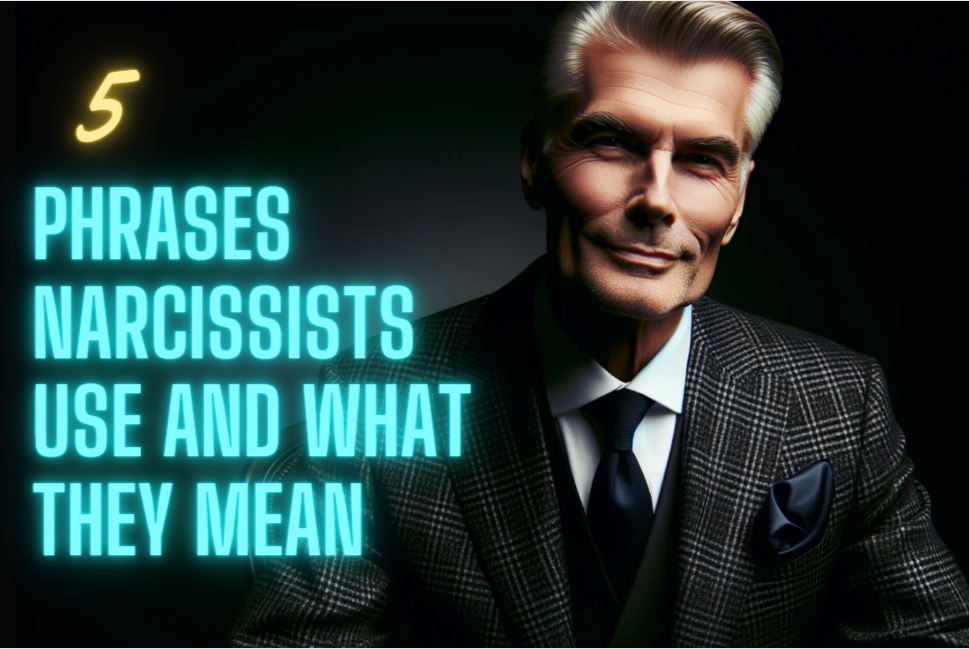Introduction
Narcissism is more than just a buzzword floating around pop psychology forums; it’s a real personality trait that can have significant impact on relationships and interactions. Understanding the verbal cues and phrases commonly used by narcissists isn’t just a party trick; it can offer valuable insights into their behavior and how they view others. In this article, we’re going to dig into five phrases you’ll often hear from narcissists, break down what they really mean, and explore the psychology behind them. So, let’s get into the phrases narcissists use.
1. “I’m the Best at What I Do”
Explain the Meaning Behind the Phrase
When you hear someone say, “I’m the best at what I do,” it might initially come off as confidence. But when a narcissist uses this phrase, there’s often a deeper layer. It’s not just about self-assurance; it’s about establishing a sense of superiority and demanding admiration from those around them.
How it Displays a Grandiose Sense of Self-Importance
A key characteristic of narcissism is a grandiose sense of self-importance. When a narcissist claims to be the best, they’re not just boasting; they genuinely believe they are above others in skill, intelligence, or whatever the case may be. This not only serves to inflate their ego but also sets the stage for the dynamic they want to create—where they are the focal point deserving of admiration and praise.
In sum, when you hear “I’m the best at what I do,” tread carefully. It’s often a red flag that you’re dealing with someone who places their own self-worth above all else, at the potential expense of those around them.
2. “You’re Too Sensitive”
Meaning and Intent Behind the Phrase
If you’ve ever been told, “You’re too sensitive,” especially after expressing how you feel, you might be dealing with a classic narcissistic tactic. This phrase isn’t about your sensitivity; it’s about deflecting responsibility and invalidating your emotions. In essence, the narcissist is saying that the problem isn’t their behavior—it’s your reaction to it.
Discuss Gaslighting and Victim-Blaming
This phrase is a textbook example of gaslighting, a psychological manipulation technique used to make someone doubt their own feelings or perceptions. By telling you that you’re too sensitive, the narcissist shifts the focus away from what they did and places the blame squarely on your shoulders. The aim? To make you second-guess yourself and to escape accountability for their actions.
So, if someone tells you that you’re too sensitive, especially when you’re calling them out on their behavior, it might be time to evaluate the nature of your relationship with that person. Because, let’s be real, no one needs that kind of negativity in their life.
3. “I Don’t Need Anyone Else”
Decode What the Phrase Means
Hearing someone say, “I don’t need anyone else,” might initially come across as a declaration of independence or self-sufficiency. However, when uttered by a narcissist, this phrase serves a different purpose. It’s less about independence and more about creating a sense of invulnerability and emotional detachment.
The Hidden Insecurity Behind the Independence Facade
Narcissists often use this phrase as a shield to protect themselves from the vulnerabilities that come with emotional connections. By claiming they don’t need anyone else, they aim to project an image of strength that’s both intimidating and isolating. But don’t be fooled—this facade often hides deep-seated insecurities and fears of inadequacy.
The claim of not needing anyone is paradoxical because narcissists actually rely heavily on the validation and admiration of others to maintain their inflated self-image. So while they may assert their independence loudly, what they’re really doing is setting up a barrier to keep people at a distance, both emotionally and psychologically.
In essence, when a narcissist says, “I don’t need anyone else,” it’s usually a complex mix of bravado and vulnerability, wrapped up in a confusing package. Keep an eye out for this phrase—it’s a red flag that can clue you in to the complicated dynamics at play.
4. “You Should Feel Lucky to Have Me”
Explain the Manipulative Undertones
When someone tells you, “You should feel lucky to have me,” it’s not a simple proclamation of self-worth. More often than not, especially when coming from a narcissist, this phrase is laced with manipulation. The goal is to make you feel inferior, as if they are the prize to be won, thereby cementing their position of power in the relationship.
How it Aims to Make the Other Person Feel Inferior
The main objective here is to tilt the balance of power. By stating that you should feel fortunate to be associated with them, the narcissist implicitly sends the message that you’re not on their level—that you’re less competent, less attractive, or less worthy in some way. This tactic can serve to undermine your confidence and make you more susceptible to further manipulation.
It’s a twisted way of bonding, where one person holds the emotional reins and isn’t afraid to pull them to maintain control. So if someone ever tells you that you should feel lucky to have them, take a step back and evaluate whether this is a relationship of mutual respect, or if it’s time to reframe your understanding of that person’s intentions.
5. “It’s Not Me, It’s You”
What it Means When a Narcissist Uses this Phrase
If you’ve ever been hit with the line, “It’s not me, it’s you,” you might have felt a mix of confusion and blame. While this phrase is commonly heard during breakups, when it comes from a narcissist, it’s about more than just shifting responsibility. It serves as a means to externalize fault, thereby keeping their self-image immaculate.
Discuss the Narcissist’s Inability to Accept Blame or Responsibility
One of the hallmark traits of a narcissist is an unwillingness to accept blame or responsibility for their actions. Instead, they often project their failures or shortcomings onto others. When they say, “It’s not me, it’s you,” what they’re actually doing is reinforcing their own narrative that they can do no wrong.
This phrase acts as a deflection shield, a way for narcissists to maintain the illusion that they are faultless beings. It’s a manipulative tactic that not only serves to absolve them of any guilt but also makes the other person feel like they are the problem, thereby enabling the narcissist to sidestep any form of accountability.
So the next time you hear, “It’s not me, it’s you,” consider it a red flag. Chances are, you’re dealing with someone who is not only unwilling to own up to their actions but is actively trying to make you the scapegoat. And frankly, that’s not a dynamic anyone needs in their life.
Conclusion
Recap the Importance of Recognizing These Phrases
Understanding the phrases commonly used by narcissists can offer valuable insights into their mindset and manipulative tactics. Recognizing these cues isn’t just academic—it’s practical knowledge that can help you navigate relationships more effectively and protect your emotional well-being.
Tips for How to Deal with Someone Who Uses Them Frequently
If you find yourself frequently encountering these phrases in a relationship, it’s worth taking a step back to assess the dynamics at play. Are you being respected? Is the relationship balanced? If the answer to these questions is “no,” it might be time to establish boundaries or even consider distancing yourself from the individual in question. After all, relationships should be about mutual respect and understanding, not power plays and manipulation.
So there you have it—five phrases to be wary of and what they really mean when coming from a narcissist. Armed with this knowledge, you’ll be better equipped to make informed decisions about the relationships you choose to invest in.





